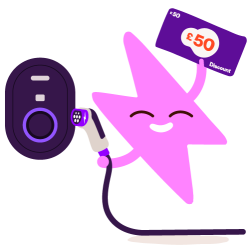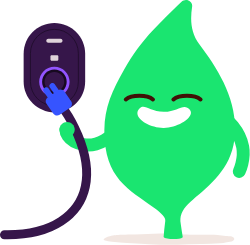Your complete guide to EVs (electric vehicles) and EV chargers.
Buying an EV home charger.
Thinking about getting an EV home charger?
Our chargers are fast, easy to use, and compatible with the majority of electric vehicles in the UK. Right now we have great deals on Wallbox and Vestel models so be sure to check out our range and see what EV home charger is right for you.
There’s 4 easy steps to getting a charger installed:
Choose your charger.
Get a quick quote.
Book your free video survey.
Get it installed.
Our installations come highly recommended and for even more peace of mind, every one of our chargers comes with a 3-year product and workmanship warranty and 24/7 customer support.
Find out how to get your EV home charger.

A home EV charger with £50 off.
E.ON Next customers can enjoy a nifty discount when they install an electric vehicle charger at home. T&Cs apply.
How to use your EV charger.
After a shiny new EV home charger?
We can show you how to get the most out of home EV charging.
Join us on your EV journey and you could:
Save money on your installation with help from government grants.
Use your new charger to save time, hassle, and money.
Switch to our Next Drive tariff.
Make your life simpler and easier with E.ON Next’s Home App and Comfort App, and a free subscription to Zoom EV.
Ready to join the EV revolution and become a charging pro? Learn all there is to know about EV charging.

Get up to £350 off your home EV charger installation.
You could be eligible for the UK Government’s EV Chargepoint Grant that covers up to 75% of the installation cost, or a maximum of £350, whichever is lower. This fantastic incentive is designed to help renters and people living in flats with dedicated off-street parking. We'll let you know if you may be eligible† when you get a quote from us.
† For full eligibility criteria, including eligible vehicle types, visit the UK Government website here
EV connector types.
Ready to join the EV revolution but feel a bit overwhelmed by it all?
Never fear, let us break it down for you.
Based on speed, there are four types of chargers - these are Slow, Fast, Rapid, and Ultra-rapid. And when it comes to connector plugs, there are 5 that are most commonly used in the UK. These are:
UK 3 pin plug.
Type 1 plug.
Type 2 plug.
CHAdeMO plug.
Combined Charging System (CCS) plug.
Lastly, there’s 2 types of cable to choose from. Tethered and untethered. Tethered EV chargers come with a fixed cable permanently attached to your charger, whereas untethered chargers come with a portable cable you can take with you.
Want to know more? Check out our full guide to EV connector types.
EV charger installations.
Thinking about installing an EV charger at home but not sure where to start?
Here’s what to consider when choosing a charger.
Budget.
Charging speed.
Features.
Compatibility.
Cable length.
Tethered or untethered.
Futureproofing.
Once you’ve considered these, the rest is easy!
We'll get you sorted with an expert, hassle free installation.
Learn more about your EV charger installation.
Protecting your EV charging cable.
You’re going to love your EV home charger. So you’re going to want to keep it safe. Here’s just a few steps you might consider to keep yours secure.
Choose a safe spot.
Safeguard cables with locks.
Use tethered chargers.
Install surveillance.
Install a safety barrier.
Attach a cable protector.
Use a wheel stop.
Store cables safely.
Learn everything you need to know about EV charger security including the latest technologies, insurance, and community initiatives.
Electric vehicles vs petrol vehicles.
Switching from petrol to electric cars is a great way to reduce CO2 emissions without drastically altering our daily routines. As well as the environmental benefits, there are many other advantages:
Fuel costs are lower for electric cars than petrol or diesel vehicles.
EVs are now the same price or cheaper than petrol or diesel equivalents.
There are more EV models on the market than ever before.
Check out our full guide for a more in-depth comparison between EVs and petrol vehicles.
Benefits of electric cars.
Ready to ditch the petrol and join the EV revolution? Discover why making the switch might be the best decision for your wallet, your lifestyle, and the planet. There’s so many benefits to going EV, we’ve had to make a long list:
Lower running costs.
Reduced noise pollution.
Convenience and accessibility..
Cleaner environment.
No congestion charge.
Smoother driving experience.
Road tax reductions.
Government grants.
Renewable electricity tariffs.
Charge at home.
Energy independence.
Future-proofing.
Learn more about the benefits of electric cars.
New and second hand EV Government incentives.
Choosing a used EV for your business is a win-win: it reduces your carbon footprint and your running costs. But did you know that there’s lots of government backed, used EV incentives and other benefits available? Here what you could be missing out on:
Financial Incentives: Incentives like capital allowances, Benefit-in-kind rates, OZEV grants for charger installation, and salary sacrifice schemes.
Additional benefits: Lower depreciation, reduced National Insurance costs, boosted employee morale, access to restricted vehicle lanes or congestion zones.
Want to learn more? Read our comprehensive guide to government incentives for buying secondhand EVs. Already got your used EV? Why not check out our range of EV chargers?
Running costs of an electric vehicle.
Electric vehicles are generally cheaper to run than petrol cars over their lifespan. This is due to a number of factors.
Electricity is cheaper than petrol or diesel.
EV service costs are lower.
Purchase incentives, grants, tax breaks and other benefits.
Want to learn more about the cost savings and other advantages of switching to an electric vehicle? Why not take a look at our EV running costs guide?
How much does it cost to charge an EV?
The cost to charge your EV will depend on the specific vehicle you drive and your charging needs, but generally, electricity is cheaper than petrol.
Charging at home is generally cheaper than using public stations, especially with an EV tariff that offers lower off-peak rates. Need a home charger? We can help with installation, and you might even qualify for an Office for Zero Emission Vehicles (OZEV) grant.
Find out more about the cost to charge your EV, including charging at public stations and charging at work.
How long does it take to charge an EV?
Well, it depends! Factors like battery size, charger speed, and even the weather can influence charging time.
And when it comes to EV charging speeds, there's no one-size-fits-all answer.
For home chargers, a 7kW model offers a good balance of speed and convenience for overnight charging - typically these give 25-30 miles of range per hour.
Public chargers offer a range of speeds, from ‘fast’ to ‘ultra-rapid’:
Fast public chargers are usually 7kW - 22kW.
Rapid public chargers range from 50kW - 100kW.
Ultra-rapid chargers range from 100kW - 350kW.
Learn more about the various charger speeds and EV charging time.
Public charging stations.
As the UK's public charging network rapidly expands, it’s becoming increasingly easy to charge your car while you go about your day. Whether you're shopping, grabbing a bite to eat, or hitting the gym, more and more locations are now offering charging stations.
And did you know E.ON is contributing to this growth by building a network of over 13,000 ultra-fast charging stations across the UK.
On long trips, remember to:
Check your charger’s charge speed and compatibility.
Know the public chargers available on your route.
Understand your EV’s real-world range.
Plan ahead and map out your charging stops.
Read our full guide to public charging stations. It covers the various charging networks, payment methods, plus how to locate chargers using apps and websites.

Get the E.ON Drive Comfort app.
E.ON Drive Comfort is the ultimate app for easy out-of-home EV charging. With access to over 20,000 charge points in the UK, and over 500,000 across Europe, our app ensures you're always powered up, wherever your journey takes you.
Pay for what you use with our flex plan, billed monthly, or subscribe for just £5.99 a month and received 10% off charge prices. Both options are commitment free. You will be billed monthly.1
1 All prices include VAT. Additional parking fees apply depending on the station operator. The price that is displayed in the app before the loading process begins always applies. Additional parking fees apply in the flexible charging and E.ON Drive tariffs if the respective charging station operator charges a parking fee. The respective maximum charging time and the costs if the maximum charging time is exceeded are displayed to you in the E.ON Drive Comfort app before the respective charging process is initiated.
Ultra fast charging stations.
Ultra-fast chargers can offer significantly faster charging speeds than standard public chargers, allowing you to add a significant amount of range to your EV in a short amount of time. Imagine adding 100 miles of range to your EV in just 10 minutes!
While not all EVs are compatible with these high-powered chargers, their growing availability across the UK and EU makes them a game-changer for long-distance EV travel.
Read our guide to ultra fast charging stations and discover how you can find them and how to use them.
How far can you drive on a single charge?
If you’re new to EVs you may feel a little range anxiety, but fear not, most models offer a comfortable 100-300 mile range, similar to many petrol cars.
There’s lots of factors that can affect how far you can drive your specific vehicle before you need to charge up:
Battery size.
Battery age.
Your driving style.
Your EV’s efficiency.
There’s also external factors such as the topography, weather conditions and even whether you’re using things like climate control.
Want to know more about how far on a single charge EVs can go? Our full guide looks at popular EV models and their respective ranges.
EV battery capacity and lifespan.
EV batteries use lithium-ion cells (like those in your phone), to store and release energy. When driving, electrons flow from the battery to power the motor. Recharging reverses this process, sending electrons back to the battery for future use.
Read our handy guide to find out more about EV charge capacity.
Replacing eClick with a home charger.
We're replacing our eClick charging system with brand new EV chargers.
If you currently have an eClick charger, you can easily upgrade to one of our new, state-of-the-art EV home chargers. They offer:
Enhanced charging efficiency. Save money and reduce your carbon footprint.
Greater affordability. Making switching both practical and economical.
Unmatched user-friendliness. Making charging your EV simple and hassle-free.
Replacing your eClick charger is easy! Just visit our home chargers page, answer a few questions, choose your charger, and we'll handle the rest, including a video survey or photo assessment and installation.
Learn more about what’s involved when replacing eClick.
EV charger support.
Need help with your E.ON Next EV home charger? This article is your go-to resource for troubleshooting common issues, like a tripped fuse or power loss. We'll guide you through solutions and explain how to contact our 24/7 support team for expert assistance. Get the help you need, when you need it, and keep your EV charged up and ready to go!

